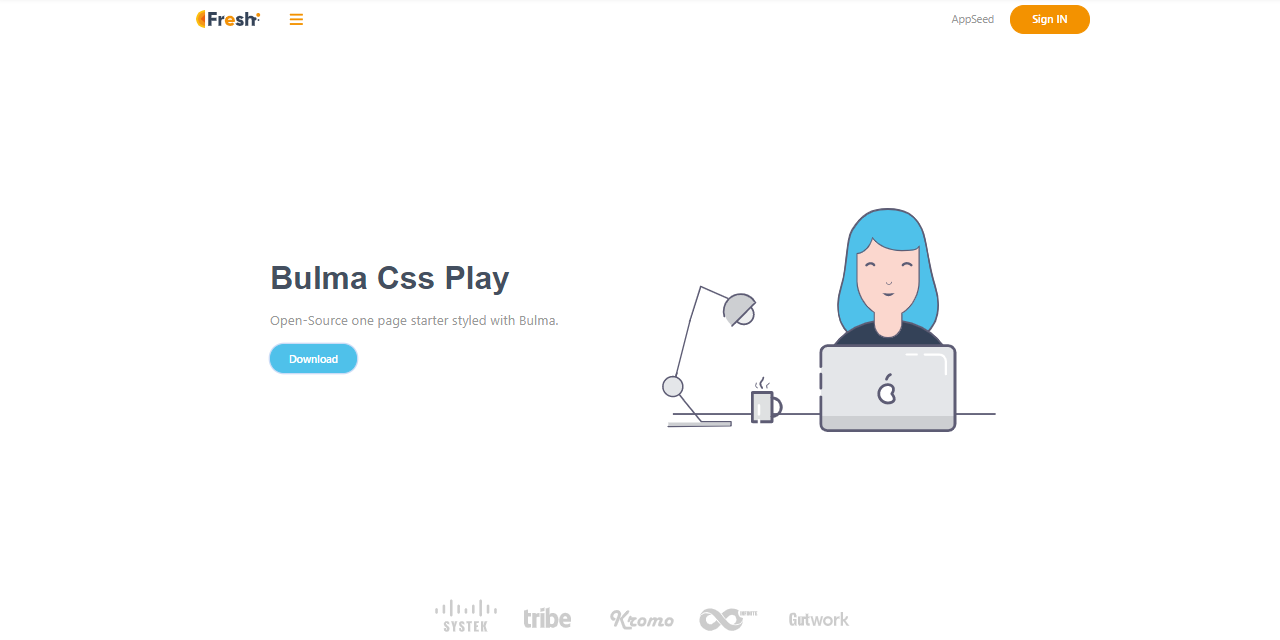https://github.com/app-generator/bulmaplay
Flask/Jinja Starter - BulmaPlay (Styled with Bulma CSS) | AppSeed
https://github.com/app-generator/bulmaplay
appseed bulma bulma-css flask-bulma jinja-template jinja2
Last synced: 6 months ago
JSON representation
Flask/Jinja Starter - BulmaPlay (Styled with Bulma CSS) | AppSeed
- Host: GitHub
- URL: https://github.com/app-generator/bulmaplay
- Owner: app-generator
- License: other
- Created: 2019-05-29T04:58:17.000Z (over 6 years ago)
- Default Branch: master
- Last Pushed: 2023-05-16T13:18:17.000Z (over 2 years ago)
- Last Synced: 2025-04-06T18:12:46.639Z (6 months ago)
- Topics: appseed, bulma, bulma-css, flask-bulma, jinja-template, jinja2
- Language: JavaScript
- Homepage: https://appseed.us/apps/flask/
- Size: 5.6 MB
- Stars: 74
- Watchers: 7
- Forks: 17
- Open Issues: 1
-
Metadata Files:
- Readme: README.md
- Changelog: CHANGELOG.md
- License: LICENSE.md
Awesome Lists containing this project
README
# [Flask/Jinja Template](https://appseed.us/apps/flask/) BulmaPlay
Seed project coded in Flask/Jinja on top of Bulma Fresh (free version), a colorful one-page design styled with Bulma CSS.
- 👉 [LIVE Demo](https://bulmaplay.appseed-srv1.com/) - starter in action
- 👉 More [Jinja/Flask Templates](https://appseed.us/apps/flask/) - free and PRO
> Features:
- ✅ UI Kit: **Bulma Fresh** (Free Version) by **CssNinja**
- ✅ Render Engine: Flask / [Jinja2](https://jinja.palletsprojects.com/)
- ✅ Deployment scripts: Docker, Gunicorn/Nginx, HEROKU
- ✅ Support via **Github** (issues tracker) and [Discord](https://discord.gg/fZC6hup).

## Build from sources
```bash
$ # Clone the sources
$ git clone https://github.com/app-generator/bulmaplay.git
$ cd bulmaplay
$
$ # Virtualenv modules installation (Unix based systems)
$ virtualenv env
$ source env/bin/activate
$
$ # Virtualenv modules installation (Windows based systems)
$ # virtualenv env
$ # .\env\Scripts\activate
$
$ # Install requirements
$ pip3 install -r requirements.txt
$
$ # Set the FLASK_APP environment variable
$ (Unix/Mac) export FLASK_APP=run.py
$ (Windows) set FLASK_APP=run.py
$ (Powershell) $env:FLASK_APP = ".\run.py"
$
$ # Set up the DEBUG environment
$ # (Unix/Mac) export FLASK_ENV=development
$ # (Windows) set FLASK_ENV=development
$ # (Powershell) $env:FLASK_ENV = "development"
$
$ # Run the Jinja Template
$ # --host=0.0.0.0 - expose the app on all network interfaces (default 127.0.0.1)
$ # --port=5000 - specify the app port (default 5000)
$ flask run --host=0.0.0.0 --port=5000
$
$ # Access the UI in browser: http://127.0.0.1:5000/
```
## Code-base structure
The project has a simple structure, represented as bellow:
```bash
< PROJECT ROOT >
|
|-- app/__init__.py
|-- app/
| |-- static/
| | |-- # CSS files, Javascripts files
| |
| |-- templates/
| | |
| | |-- includes/ # Page chunks, components
| | | |
| | | |-- navigation.html # Top bar
| | | |-- sidebar.html # Left sidebar
| | | |-- scripts.html # JS scripts common to all pages
| | | |-- footer.html # The common footer
| | |
| | |-- layouts/ # App Layouts (the master pages)
| | | |
| | | |-- base.html # Used by common pages like index, UI
| | | |-- base-fullscreen.html # Used by auth pages (login, register)
| | |
| | index.html # The default page
| | login.html # Auth Login Page
| | register.html # Auth Registration Page
| | page-404.html # Error 404 page (page not found)
| | page-500.html # Error 500 page (server error)
| | *.html # All other pages provided by the UI Kit
|
|-- requirements.txt
|
|-- run.py
|
|-- ************************************************************************
```
## Deployment
The project comes with a basic configuration for [Docker](https://www.docker.com/), [HEROKU](https://www.heroku.com/), [Gunicorn](https://gunicorn.org/), and [Waitress](https://docs.pylonsproject.org/projects/waitress/en/stable/).
### [Docker](https://www.docker.com/) execution
---
The steps to start the template using Docker:
> Get the code
```bash
$ git clone https://github.com/app-generator/bulmaplay.git
$ cd bulmaplay
```
> Start the app in Docker
```bash
$ sudo docker-compose pull && sudo docker-compose build && sudo docker-compose up -d
```
Visit `http://localhost:5005` in your browser. The app should be up & running.
### [Heroku](https://www.heroku.com/)
---
Steps to deploy on **Heroku**
- [Create a FREE account](https://signup.heroku.com/) on Heroku platform
- [Install the Heroku CLI](https://devcenter.heroku.com/articles/getting-started-with-python#set-up) that match your OS: Mac, Unix or Windows
- Open a terminal window and authenticate via `heroku login` command
- Clone the sources and push the project for LIVE deployment
```bash
$ # Clone the source code:
$ git clone https://github.com/app-generator/bulmaplay.git
$ cd bulmaplay
$
$ # Check Heroku CLI is installed
$ heroku -v
heroku/7.25.0 win32-x64 node-v12.13.0 # <-- All good
$
$ # Check Heroku CLI is installed
$ heroku login
$ # this commaond will open a browser window - click the login button (in browser)
$
$ # Create the Heroku project
$ heroku create
$
$ # Trigger the LIVE deploy
$ git push heroku master
$
$ # Open the LIVE app in browser
$ heroku open
```
### [Gunicorn](https://gunicorn.org/)
---
Gunicorn 'Green Unicorn' is a Python WSGI HTTP Server for UNIX.
> Install using pip
```bash
$ pip install gunicorn
```
> Start the app using gunicorn binary
```bash
$ gunicorn --bind 0.0.0.0:8001 run:app
Serving on http://localhost:8001
```
Visit `http://localhost:8001` in your browser. The app should be up & running.
### [Waitress](https://docs.pylonsproject.org/projects/waitress/en/stable/)
---
Waitress (Gunicorn equivalent for Windows) is meant to be a production-quality pure-Python WSGI server with very acceptable performance. It has no dependencies except ones that live in the Python standard library.
> Install using pip
```bash
$ pip install waitress
```
> Start the app using [waitress-serve](https://docs.pylonsproject.org/projects/waitress/en/stable/runner.html)
```bash
$ waitress-serve --port=8001 run:app
Serving on http://localhost:8001
```
Visit `http://localhost:8001` in your browser. The app should be up & running.
## Credits & Links
- [Flask Framework](https://www.palletsprojects.com/p/flask/) - The official website
---
[Jinja Template](https://appseed.us/jinja-template) BulmaPlay - Provided by **AppSeed** [App Generator](https://appseed.us/app-generator).